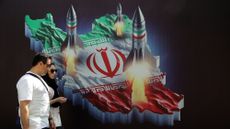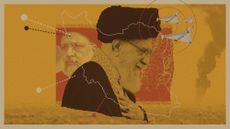Rashida Tlaib said something extraordinary about Israel. Then Republicans perverted it.
On the smearing of the most prominent Palestinian-American in the country


Over the past two days, senior Republican leaders once again attacked a Democratic woman of color by taking remarks out of context and twisting their clear meaning beyond recognition. This week's victim of what now seems like a long-term GOP plan to fixate the fear and loathing of the party's elderly white supporters on these women was first-term Congresswoman Rashida Tlaib (D-Mich.), who House Republican Conference Chair Liz Cheney (R-Wyo.), House Minority Whip Steve Scalise (R-La.) and others accused of saying that the Holocaust gives her a "calming feeling" during a recent interview.
This latest episode is troublesome not just for the terrible-faith attacks leveled at Tlaib or the insistence on spreading misleading, viral ugliness even when you know perfectly well what you're doing — a practice not limited to the right but that is certainly dominated by it. The hysterical reaction to Tlaib's comments also highlights how the American right is in thrall to mythologies about the state of Israel that were debunked 30 years ago by Israel's own historians — bedtime stories that serve to absolve Israelis of any responsibility for the plight of the Palestinians and to excuse America's complicity.
What did Tlaib actually say? As always, it is worth reprinting the full text: "There's, you know, there's a kind of a calming feeling, I always tell folks, when I think of the Holocaust and the tragedy of the Holocaust, and the fact that it was my ancestors — Palestinians — who lost their land and some lost their lives, their livelihood, their human dignity, their existence, in many ways, had been wiped out. ... I mean, just all of it was in the name of trying to create a safe haven for Jews, post-the Holocaust, post-the tragedy and the horrific persecution of Jews across the world at that time."
Subscribe to The Week
Escape your echo chamber. Get the facts behind the news, plus analysis from multiple perspectives.

Sign up for The Week's Free Newsletters
From our morning news briefing to a weekly Good News Newsletter, get the best of The Week delivered directly to your inbox.
From our morning news briefing to a weekly Good News Newsletter, get the best of The Week delivered directly to your inbox.
Republicans disingenuously seized on the "calming feeling" while deliberately excluding the rest of the quote. Tlaib is obviously not saying that she feels serene and happy when she thinks about the worst crime committed in the history of human civilization. You don't need to agree with Tlaib about anything to recognize that she's being thoughtful rather than hateful here. She was trying to grapple with both the predicament of the Palestinian people, whose statelessness was the direct result of Israel's creation, as well as that of the Jewish people.
It's a fraught subject for anyone to tackle publicly with any kind of nuance — let alone the woman who is suddenly the most prominent Palestinian-American in the country — without accidentally stepping on some historical landmine. When I first studied this conflict in the late 1990s as a college student, I found it extraordinary that Israelis and Palestinians had totally different narratives of the same episodes, including different names and irreconcilable factual accounts. Israelis refer to the events Tlaib was discussing as "The War of Independence." Palestinians call it "al-Nakba" – the catastrophe.
Around 700,000 Palestinians became refugees during the communal and interstate war that led to the creation of Israel in 1948-1949. About that there is no controversy. But senior Republicans appear to believe the fairy tale that Israelis were told until it was challenged by their own historians in the late 1980s that Palestinians left their homes voluntarily, at the behest of their own leaders, thereby surrendering claims to their homes and the land.
Many Israelis long ago reckoned with some degree of culpability for Palestinian suffering when the country's self-styled "new historians" challenged the official story, most notably with the publication of Benny Morris' The Birth of the Palestinian Refugee Problem in 1988. These researchers could find little real evidence for the idea that any significant number of Palestinians were instructed to leave their homes by community leaders. They did, however, uncover extensive evidence that, particularly later in the conflict, Israeli forces deliberately uprooted entire Palestinian villages and towns as part of the war effort. These are the events that Tlaib is referencing when she talks about how her ancestors lost their land, lives, and livelihoods.
But Republicans, as part of their Orwellian effort to cast contemporary Democrats as anti-Semites, continue to cling to a one-sided story that places all of the blame on the Palestinians themselves for their plight. This was especially obvious when Republicans addressed the actual substance of Tlaib's remarks. Scalise's spokeswoman Lauren Fine attacked what she called Tlaib's "historically inaccurate claims of Palestinian victimhood at the hand of Jewish refugees." Cheney tweeted, "And her 'history' of what happened after is a fantasy based on lies spread to delegitimize the state of Israel." Both of these statements perfectly capture the genuinely child-like attitude on the American right regarding the circumstances of Israel's founding. They are saying, in effect, that Palestinian refugees were not victims at all and any account that places any blame on Israelis is "a fantasy."
You don't need to endorse Tlaib's vision for a single, binational state — rather than the two-state solution that feels increasingly mythical itself — to acknowledge the historical reality that Palestinians were forced out of their homes, either through deliberate expulsions carried out by the Israeli military or by legitimate fears about what would happen to them if they were to remain. Tlaib didn't even say anything about those expulsions being carried out by "Jewish refugees" as Cheney claims. There's no need to wade too deep into what is a very complex historical controversy to understand that there were indeed Palestinian victims, that the creation of Israel involved the dispossession of hundreds of thousands of innocent people and that this tragedy remains central to Palestinian identity and experience.
What Tlaib was saying was actually pretty extraordinary coming from a prominent Palestinian. In essence, she acknowledged that though the Palestinian people were dispossessed as a consequence of Israel's founding, the fact that many Jews found a safe haven in the process has to be entered into the ledger too. She was saying that she takes some comfort in the fact that her people's tragedy led to another's salvation. It is the kind of mutual reckoning that must be undertaken by both Palestinians and Israelis if there is ever to be a just resolution of the conflict.
The effort to smear Rashida Tlaib for these completely unproblematic and deeply human ruminations is dispiriting enough, and a reminder that shamelessness has absolutely no limits in today's Republican Party. But it is even more depressing to recognize that the Republican Party has yoked itself to such a preposterous, maximalist vision of the Israeli-Palestinian conflict, one that is not at all shared by American Jews.
Now that the Trump administration has uncritically embraced both the policies and the narratives of the Israeli right, and the Israeli left has been destroyed, it means we are farther than ever from realizing the vision of the longstanding consensus two-state solution, let alone Tlaib's one-state proposal. And it portends real danger for the Palestinians, whose dreams of statehood are likely to be set aside in favor of doublespeak about "economic incentives" when Jared Kushner's "peace plan" is finally revealed to the public. With the far right ascendant in both Israel and the United States, there is also the potential for much darker outcomes, including the Israeli annexation of large swathes of the West Bank without any change in the Palestinians' political situation.
None of this, in other words, should give anyone a calm feeling about anything.
Create an account with the same email registered to your subscription to unlock access.
Sign up for Today's Best Articles in your inbox
A free daily email with the biggest news stories of the day – and the best features from TheWeek.com
David Faris is an associate professor of political science at Roosevelt University and the author of It's Time to Fight Dirty: How Democrats Can Build a Lasting Majority in American Politics. He is a frequent contributor to Informed Comment, and his work has appeared in the Chicago Sun-Times, The Christian Science Monitor, and Indy Week.
-
 5 carefully selected cartoons about the Trump-Daniels jury selection process
5 carefully selected cartoons about the Trump-Daniels jury selection processCartoons Artists take on a stress-free life, rare peers, and more
By The Week US Published
-
 Loire Valley Lodges review: sleep, feast and revive in treetop luxury
Loire Valley Lodges review: sleep, feast and revive in treetop luxuryThe Week Recommends Forest hideaway offers chance to relax and reset in Michelin key-winning comfort
By Julia O'Driscoll, The Week UK Published
-
 Myanmar: the Spring Revolution and the downfall of the generals
Myanmar: the Spring Revolution and the downfall of the generalsTalking Point An armed protest movement has swept across the country since the elected government of Aung San Suu Kyi was overthrown in 2021
By The Week Staff Published
-
 Myanmar: the Spring Revolution and the downfall of the generals
Myanmar: the Spring Revolution and the downfall of the generalsTalking Point An armed protest movement has swept across the country since the elected government of Aung San Suu Kyi was overthrown in 2021
By The Week Staff Published
-
 Israel hits Iran with retaliatory airstrike
Israel hits Iran with retaliatory airstrikeSpeed Read The attack comes after Iran's drone and missile barrage last weekend
By Peter Weber, The Week US Published
-
 Is there a peaceful way forward for Israel and Iran?
Is there a peaceful way forward for Israel and Iran?Today's Big Question Tehran has initially sought to downplay the latest Israeli missile strike on its territory
By Sorcha Bradley, The Week UK Published
-
 'A direct, protracted war with Israel is not something Iran is equipped to fight'
'A direct, protracted war with Israel is not something Iran is equipped to fight'Instant Opinion Opinion, comment and editorials of the day
By Harold Maass, The Week US Published
-
 'Good riddance to the televised presidential debate'
'Good riddance to the televised presidential debate'Instant Opinion Opinion, comment and editorials of the day
By Harold Maass, The Week US Published
-
 Sudan on brink of collapse after a year of war
Sudan on brink of collapse after a year of warSpeed Read 18 million people face famine as the country continues its bloody downward spiral
By Peter Weber, The Week US Published
-
 How powerful is Iran?
How powerful is Iran?Today's big question Islamic republic is facing domestic dissent and 'economic peril' but has a vast military, dangerous allies and a nuclear threat
By Harriet Marsden, The Week UK Published
-
 Israel's war is America's, too
Israel's war is America's, tooOpinion 'Death to America' and 'Death to Israel' are just different slogans for the same hatred
By Mark Gimein Published